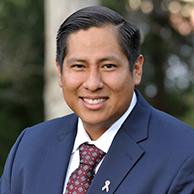 From the Advocate
From the Advocate
January 2024
Look Ahead at 2024
There is always something so hopeful and exciting about the possibilities that a new year brings. So, as I started to think about what I wanted to share in this first column of 2024, an overview of the comprehensive support The California Office of Small Business Advocate (CalOSBA) offers seemed like a good place to start. Immediately, I felt energized just looking at our portfolio of programs and initiatives. Many of which, I am proud to say, are directly supported by legislation passed by Governor Newsom or in partnership with other state agencies including The Governor’s Office of Business and Economic Development (GO-Biz.)
Even as I am writing this, the CalOSBA team has hit the ground running bringing their strong service ethos to further strengthening the CalOBSA ecosystem; growing our ranks of new and returning small businesses that benefit from our online resources and our in-person, 1 to 1 business support offered at the Small Business Development Centers and Inclusive Innovation Hubs .
Introducing the 3Ds of CalOBSA
To better explain how CalOSBA advocates for small businesses, we’ve prioritized three key areas:
- Democratizing Access to Capital
- Diversifying the Innovation Economy
- Driving Economic Mobility through Entrepreneurship
These “3Ds” also help owners identify the programs available to them, based on the stage their business is currently operating – whether starting-up or looking to grow. I’m committed to making each of the 3Ds an important contributing factor to the viability of small businesses and entrepreneurs. Launched under our Entrepreneurship & Economic Mobility Task Force (EEMTF) – a multi-generational and diverse group of entrepreneurs and thought leaders from across the state – the 3Ds were turned into a framework with actionable items at a day-long workshop of task force members, small business owners, entrepreneurs and my team.
Breaking down the 3Ds – Democratizing Access to Capital
It can’t be stated enough how important the success of small businesses are to local and national economies. Democratizing access to capital protects the viability of small businesses by ensuring the process, underwriting and securing of funding is equitable among ALL small businesses. Our goal is to continuously find better and more inclusive capital delivery systems to combat the inadequate funding and systemic roadblocks businesses owned by women, people of color, immigrants, veterans and LGQBT face. Securing funding is even more difficult to obtain in socio-economically disadvantaged and rural areas. When you consider that minority-owned small businesses support 2.56 million California jobs annually and half of our private sector workforce depends on small businesses, California needs to do better.
Our Technical Assistance for Capital Readiness program funds business support providers across the state. Started as a five-year pilot in 2017, Governor Newsom made it a permanent program, earmarking $23 million a year of General Fund dollars after seeing early results. The Governor also announced $1.1 billion in new funding from the US Treasury’s State Small Business Credit Initiative (SSBCI) to support California’s small businesses, particularly those in Socially and Economically Disadvantaged populations and in wake of the Writers and Actors strikes, he passed the Equitable Payroll Fund which gives grants to small nonprofit performing arts organizations through payroll reimbursements. AB 2019 was also signed making it law that state agencies must award a minimum 25 percent of their contracts to small businesses thereby creating a huge opportunity with billions of dollars at stake across a range of industries.
Diversifying the Innovation Economy
If you’re just about to do a Google search for “Innovation Economy,” let me provide a brief overview of this relatively new field of economics which focuses on innovation and technology but thrives on entrepreneurialism and creating new markets and new industries. Silicon Valley — the semiconductor, computer, software, and electronics industries — is its most successful example. California continues to dominant the startup ecosystem and has received over 51 percent of all venture capital invested in the US. An honor unlikely to change with the surge in green tech, advanced manufacturing and life sciences.
Accelerate California was launched to expand the reach of California’s innovation economy; highlight the need for more diverse founders; and increase funding to these underrepresented entrepreneurs who historically have received very limited venture capital funding. Aside from being fair and equitable, investing in minority-owned businesses is a sound decision given female founders represent 49% of all startups and first-generation immigrants start businesses at a 27% higher rate than Americans who are not immigrants.
We’re also expanding Made in California in 2024 – the labeling program that helps manufacturers showcase their products made in California while building awareness in other states about components available from California. The program also has the feel-good benefit of promoting California pride by advocating to consumers to purchase made-in-California.
Driving Economic Mobility through Entrepreneurship
The third of CalOSBA’s 3Ds – Driving Economic Mobility through Entrepreneurship is not only the mission that has driven most of my career and carried me to this position but is also a cornerstone of Governor Newsom’s California For All vision.
In September 2023, the Governor issued an executive order directing every state agency to take additional actions to embed equity analysis in their policies and to take critical actions against discrimination. Entrepreneurship (and as I’ve established a California specialty) fuels innovation and economic growth and has the potential to drive economic mobility and create wealth for generations.
In July, CalOSBA launched CA RISE, an investment of $25 million to build capacity and provide capital to businesses that hire, train, and support California workers facing barriers to employment. Employment social enterprises (ESEs) are recognized for improving business stability and advancing economic mobility for their employees.
We’re also looking to the California Employee Ownership Hub (SB 1407) to combat wealth inequality and drive economic mobility. With a mandate to raise awareness about employee ownership; assist business owners and employees in navigating resources; reduce barriers to employee ownership and partner with employee ownership experts, SB 1407 helps business owners more easily sell their business to employees who otherwise wouldn’t have the opportunity to be an owner – a welcome option for businesses closing or facing workforce shortages like the high numbers of Baby Boomers retiring.
Stay informed in 2024
I’ve taken a deep dive into many of the programs within the CalOSBA ecosystem with good reason! It’s my hope that it affirms my commitment to advancing our work Democratizing Access to Capital, Diversifying the Innovation Economy and Driving Economic Mobility through Entrepreneurship. I couldn’t be more proud to lead the effort to represent and elevate California’s hardworking small business owners and their employees in 2024.



















































